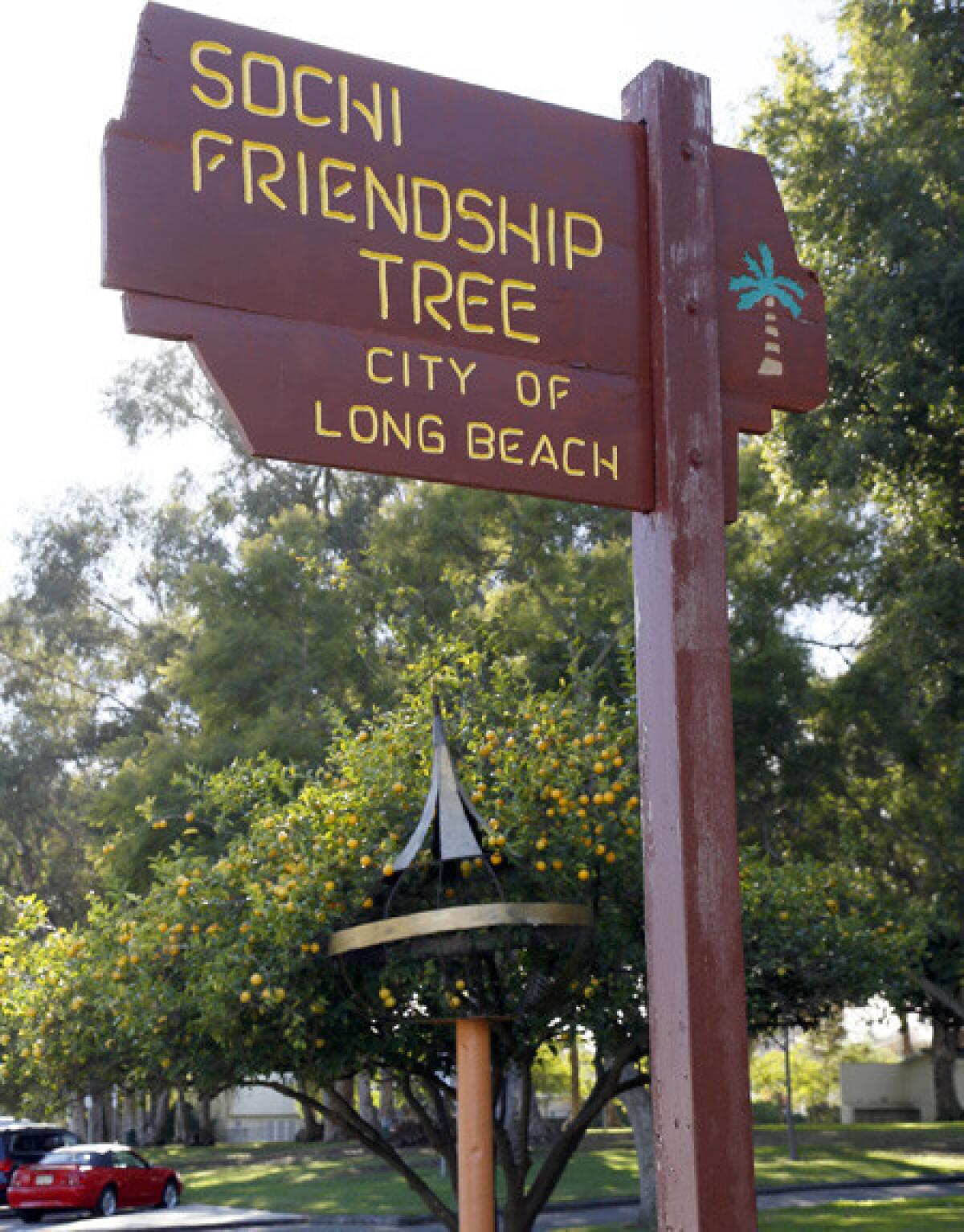Gay-rights issue hasn’t strained Long Beach-Sochi sister-city bond

Sochi Friendship Grove looked like a pleasant place for reflection on a Friday afternoon, a chance to ponder the ideals and beliefs of the Olympic movement with the opening ceremony exactly three weeks away.
Uniformed high-school students, classes done for the day, streamed across the street past the park. The lemon-filled Friendship Tree, planted in 1992, was a short skateboard ride away, and to get there, you could go past a wall mural with the Olympic rings and snow-peaked mountains.
This winter day, however, was not a 40-degree afternoon in Sochi, Russia, the site of the Olympics, but an unusually warm offering, almost 80 degrees, in Long Beach, sister city of Sochi.
For most Americans, the Olympics don’t start to resonate until the first puck is dropped or the first skater wobbles over to the kiss-and-cry area. And for most Long Beach residents, even longtime ones, the affiliation going back to the early ‘90s between the two cities is new information.
Silvin Fernando, who spotted the mural when he was taking a walk through Recreation Park, said, “I thought it was an advertisement.”
College student Lena Bishop was sitting under a tree in the park and didn’t know about the sister-city connection. But to be fair, it’s fairly easy to miss the mural, as well as the Sochi Friendship Grove signage on the corner of 7th Street and Park Avenue.
“I chose this park because it’s down the street from my house; it’s the closest park,” Bishop said. “I watch the Olympics, but I’m not hard-core about it.”
Recreation Park also contains a venerable sports facility, Billie Jean King Tennis Center, named after the Long Beach-born and -raised legend, winner of 39 Grand Slam singles and doubles titles.
King, 70, stepped back into the national spotlight when President Obama last month selected her to represent the United States in Sochi, along with hockey player Caitlin Cahow and figure skating star Brian Boitano.
The selection of three prominent gay athletes, including the famed King, world-renowned for her pioneering efforts for women’s rights, sent a loud-and-clear message to Russia about its anti-gay laws.
In September, Long Beach’s City Council passed a resolution condemning Russia’s discriminatory laws and policies, a motion authored by Councilman James Johnson, who represents the 7th District.
It did not, as some urged, take the more drastic step of kicking the sister city out of the family.
“The beauty of a sister-city relationship allows us to engage and have constructive dialogue,” Johnson said in an interview with The Times. “What I want to do is send a message to folks in Sochi that this is unacceptable and ask them, through our sister-city relationship, to re-examine this policy.
”. . . This is passed by the Kremlin, not passed by local officials in Sochi, or average people, but I do think they can speak out. It may be very difficult in that society, which is not an open democracy, to do so. So I understand what we’re asking for is a big ask. My concern with severing ties is that it would be counterproductive, if the goal is to open people’s minds and hearts and really get them to re-examine this kind of discriminatory policy.”
Long Beach has other sister-city relationships, including Manta, Ecuador; Mombasa, Kenya; Phnom Penh, Cambodia; Qingdao, China; and Yokkaichi, Japan. The affiliation between Long Beach and Yokkaichi is the oldest, going back to 1963.
Richard Madeira, chairman of the Long Beach/Sochi Sister City Assn., has traveled to Sochi seven times. Long Beach had been looking for a sister-city relationship in Russia, focusing on several coastal cities as candidates. Russian officials came back with Sochi, a resort on the Black Sea.
“This was a little backwater spa resort for many years that no one knew anything about other than the Russian people,” Madeira said. “Now they’re suddenly on the world stage. They’ve gone through this enormous transformation.”
Madeira does not support the suggestion of suspending the sister-city program between Sochi and Long Beach.
“I thought it was unwise,” he said. “This is a conduit, a foundation, a springboard to create peace and understanding and dialogue and communication. To toss that out the window seems very unwise to me. If anything, it can be used as a tool, as a vehicle to create understanding between our two countries, to create understanding why this issue is even occurring.
“That’s not to say I disagree with the gay community because I don’t at all. I totally understand their point of view and what they’re suggesting. But I’m saying specifically to suspend the sister-city program, to do that is a mistake.”
Johnson was of a like mind.
“Look, we’ve had sister cities in communist nations for many years and in nations that have had child labor [issues],” he said. “If we only had sister cities in countries that had similar democratic values as us, we may only have sister cities in Canada and England.”
Twitter: @reallisa
More to Read
Go beyond the scoreboard
Get the latest on L.A.'s teams in the daily Sports Report newsletter.
You may occasionally receive promotional content from the Los Angeles Times.







